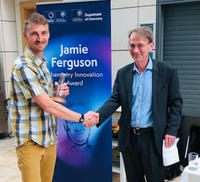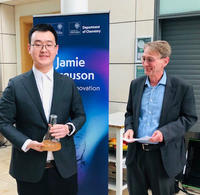The Jamie Ferguson Chemistry Innovation Awards 2023
The Jamie Ferguson Chemistry Innovation Awards 2023
The Department of Chemistry, in partnership with Oxford University Innovation (OUI), is seeking Oxford Chemistry students with innovative, game-changing ideas based on their research to take part in the Jamie Ferguson Chemistry Innovation Awards 2023. Following last year’s success of the inaugural awards, affectionately known as the Jamies, this year’s competition is now open for applications.
The Jamies were created as a legacy to our dear friend and colleague Dr Jamie Ferguson who tragically died in August 2020 after succumbing to COVID-19. Building on Chemistry’s legacy for innovation and impact, the awards provide a platform for entrepreneurial students with a passion for creating positive change and impact from their work. Last year saw four winners from a field of eight finalists, each presenting a pitch with a Q&A to experts in the fields of Chemistry and innovation with topics ranging from materials science to combatting disease.
We asked the previous winners to give some advice and insight from their experiences:
Katherine Laney - A hydrophobic solution to the solar energy challenge

Our first winner in 2022 was Katie Laney from St Hugh's College, who is in the O'Hare Group. The O'Hare Group is a large, multi-disciplinary research team working across the broad areas of catalysis, nanomaterials, polymers and the green economy. They are working towards finding solutions to global issues relating to energy, zero carbon and the circular economy.
Katie said: "My name is Katherine Laney and I am a current 3rd year DPhil student in the O’Hare group focused on Layered Double Hydroxide chemistry. My current DPhil work looks at hydrophobic coatings for food packing. However, I believed there could be many applications for this technology. The Jamies gave me an opportunity to explore new applications and I came up with an idea in a completely different industry in the area of sustainability. I can’t say too much more about it right now as I’m working with my supervisor Professor Dermot O’Hare and OUI on patent protection. Watch this space! The Jamies have taught me a huge amount from the moment I applied. I have gained valuable insights into patents and guidance in pitching and have gone on to pitch to a number of people including Oxford Nanopore CEO Gordon Sanghera. I am currently working with OUI to begin the process of patenting and hope to turn this technology into a scientific spin out company. My advice for people thinking of applying this year would be to try and think about how your research could be applied in a broader context, the idea doesn’t need to be completely separate to your research but could just be a new application which hasn’t previously been explored."
Amber Truepenny - A novel approach to protein stabilisation for diseases with no current treatment

Amber Truepenny from Hertford College is in the Brennan Group. The Brennan Group work at the interface of chemistry and biology to design probes and inhibitors to investigate the intricate workings of human proteins and cells, with particular interest in epigenetics and dementia.
Amber says: "Hi, I’m Amber, a second year DPhil student on the Chemistry in Cells programme, supervised by Professor Paul Brennan and Professor Benedikt Kessler. My idea for The Jamies was around the design and production of ‘Deubiquitinase Targeting Chimeras’ or DUBTACs to stabilise protein targets for a range of diseases of unmet need. The experience has improved my presentation and entrepreneurial skills, learning how to get across my idea to a diverse audience, and emphasising its commercial importance and impact. I will continue working on the idea as part of my PhD programme, and I am using the prize money to attend a conference in order to network with other scientists and bring project closer to patenting and to market. My advice for someone thinking of applying for the Jamies is to just give it a go and apply, even if you think your idea is far from being commercially viable, the experience will give you the skills to see how it can be taken further and understand the crossover between academia and start-ups/industry."
Tobias John - Asparagine and cysteine as therapeutic supplement against diabetes and alcohol flush

Tobias John from Hertford college was in the Schofield Group and is now working at Oxford Nanopore. Schofield Group research involves functional and mechanistic studies on enzymes of interest to healthy human physiology and disease, with particular areas of interest including the roles of metallo-enzymes in hypoxia sensing, epigenetics and drug resistance. Tobias completed his DPhil in January 2022 and joined Oxford Nanopore Technologies straight afterwards as a Research Scientist.
Tobias says: "My idea is a result of a project that I worked on during my DPhil. It's related to asparagine biosynthesis inhibition by ethanol-derived acetaldehyde and diabetes-related methylglyoxal. The toxic effect of these aldehydes can be counteracted by asparagine and aldehydes can be detoxified with cysteine, which makes asparagine and cysteine an ideal supplement for treating hangover or diabetes. The Jamies gave me a great chance to try and tell my project in two minutes and get questions from persons with an entrepreneur mindset.”
Asked what advice he would give to prospective applicants for 2023, Tobias said: “Talk to lots of people about your project, in particular lay people, it's great practice and can sometimes even give you ideas about future directions/experiments.”
Xingzao Wang - Photopore sequencing—when an LED flickers upon a nanopore

Xingzao Wang from Linacre College is in the Bayley Group. The Bayley Group research membrane proteins – in particular channels and pores – and investigate both the fundamental properties of these proteins and their applications in biotechnology, including in sensing and sequencing, single-molecule chemistry, and the fabrication of synthetic tissues.
Xingzao graduated in 2017 with a BSc in Chemistry from the University of Groningen. Later he completed his MSc degree in Chemical biology at the University of Leiden. In 2020, Xingzao started his DPhil research on photoreversible control of transmembrane communication in synthetic tissue in the group of Prof. Hagan Bayley.
Asked about his idea for last year’s Jamies, Xingzao said: “Photo-nanopore sequencing was proposed to provide a faster and more accurate solution to the next-generation sequencing technology. Our goal is to solve the dominant error caused by homopolymers in nanopore sequencing. This technology employs the identical photo-nanopore molecules created in my DPhil project with kind help from Aidan Kerckhoffs, but for a completely different intended purpose and application. I am grateful for the confidence boost and opportunity offered by the Jamies. They turned my scientific curiosity into a future innovation that might help tackle scientific and economic challenges. “The Jamies also taught me the importance of selling your idea. A brilliant idea would not generate value until it is executed and presented to the very first customer.”
Asked about his future plans and advice for 2023 applicants, Xingzao said: “Oxford Nanopore Technology and I reached a preliminary agreement that they will support my investigation into the compatibility of the photo-nanopore in their current MinION device. Thus my primary goal is to validate the idea and make the first viable product. The Jamies is a fantastic opportunity to think the impossible for your future career. If you know the value and potential of your DPhil project, the Jamies is the perfect chance to learn about IP and entrepreneurship.”
The competition is open to all current Oxford Chemistry students and more information about how to apply can be found on the Chemistry intranet.




